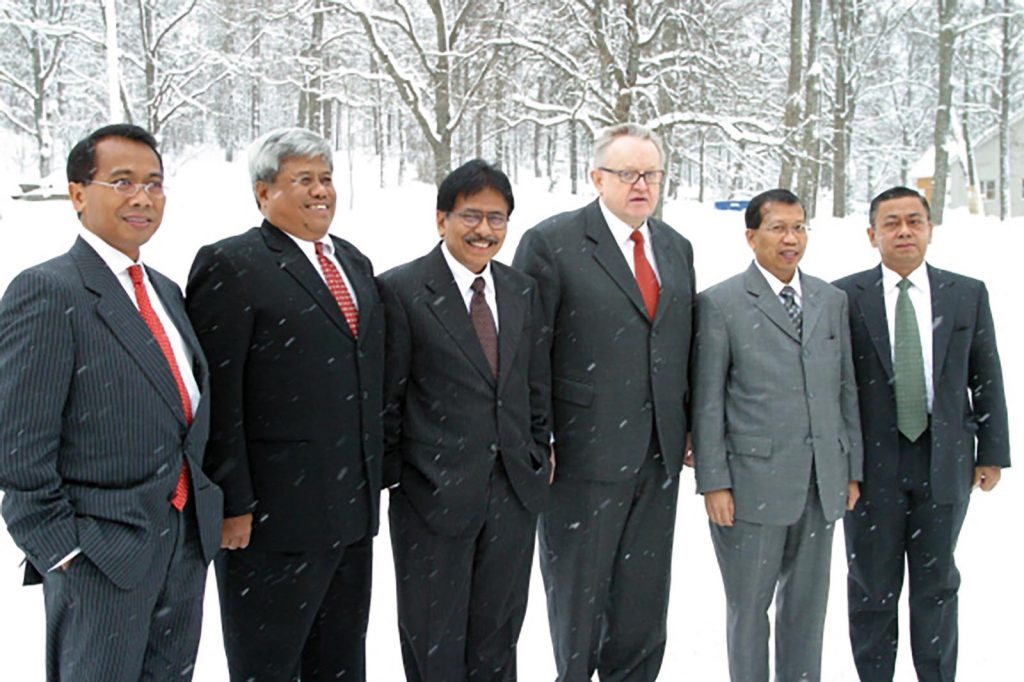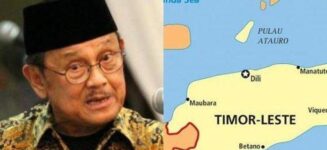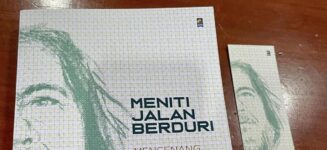The amnesty offered to GAM (Free Aceh Movement) rebels following the Helsinki peace accord – indeed, that accord itself – is a case of reconciliation between post-authoritarian Indonesia and one former adversary. For the first time, a deal has been stroked with one of New Order’s fiercest enemies and victims. However, Suharto political machinery’s biggest victim is still the forgotten political left of the sixties – at home and exiled. In Europe, the exiles are at pain to learn that GAM rebels, who had fought against the state they helped found, defend and still love, have received amnesty and regained civil rights, which they could only long for.
“No one should touch the existing state of Indonesia from Sabang to Merauke because the Acehnese were not spectators, but took part in the revolutionary struggle of 1945,” said `Bahrum Salman’. Bahrum’s real identity, he disclosed to Radio Netherlands, is Cut Husein Fatly of Tapaktuan, one of the three Acehnese who set up the first Aceh branch of Indonesian Communist Party (PKI) in 1956. His comrades were killed in the mid-sixties as were his wife and 11 other women in what was known as Aceh Gerwani (PKI women movement) massacre.
Cut left for China in 1964 and moved to Amsterdam in 1980. At 85, he retains his nationalistic fervor, helps promoting Indonesian dances in Europe and proudly celebrated the 60th independence-day at the Ambassador’s residence in Wassenaar.
For Cut, Hasan M. di Tiro’s GAM is no different from Daud Beureu’eh’s Darul Islam. “They wanted to change this state, so I resisted.” Like the late poet Agam Wispi, he belong to the old guard of Acehnese defenders of Indonesian nationalism.
Given the agony they went through since 1965, virtually all exiles predictably find Jakarta’s deal with GAM “unjust” to them. Said Cut Husein, “we were the first victim (of the Army). A million of us had been killed!” He welcomes the peace, but warns “don’t let the Acehnese be intimidated by the GAM and killed by the Army. Let them think freely.”
Tom Iljas, 66, another exile from West Sumatra living in Stockholm, is also upset. A young man from Painan, he joined campaign against the PRRI regional rebellion in the mid-fifties. The local authorities were impressed and recommended him for a scholar-ship to study in China. His only “sin” was apparently that he joined the pro-Sukarno student organization (PPI) in Beijing – thus, he lost his Indonesian citizenship.
As GAM rebels returning to the society with some rewards, Tom said, he welcomes the peace “with pain”. “I’m jealous because they took arm, yet become normal, respectable citizens. We didn’t take arm, (but) our rights were robbed without being tried. No rebels were treated like us. Look at (PRRI leader Col.) Ahmad Husein, the state facilitated his business.”
An Indonesian diplomat in Stockholm said “may be you should first take arm and rebel.” That’s “a cynical joke,” said Tom, who often met with GAM leaders in the city but keeps a distance because “we are on different sides.”
Francisca Fangidaey, 80, another exile with undoubted patriotic credentials, is “astonished” about Jakarta’s deal with GAM. It means, “we, the exiles, are regarded as traitors, that hurts me deeply.” A Dutch educated Floresian woman, who “felt Dutch and thought completely in Dutch (when the Dutch ban Malay),” Francisca said, “the first Indonesian words I learned were Bung Karno, Bung Hatta and merdeka (freedom).” She became a heroin of independence war as she joined young militants in Java and sought supports abroad.
Now living in Zeist, the Netherlands, Ibu Sisca hopes President Susilo Bambang Yudhoyono administration will bring changes. “Opening a dialog and returning our passports are the least he should do to us,” she said, adding that other issues like indemnification and political party are “of secondary importance”.
The agony of being left out in the cold is related to the Cold War that is apparently far from over at home. At the same time, unlike the GAM, they have nothing to bargain with – no arms, no guerilla’s, no territory, no homeland, no tsunami.
It’s a hard reality for the exiles, whom President Abdurrachman `Gus Dur’ Wahid once called “the wandering freedom fighters”. As the three cases above show, they are remaining loyal and emoti- onally attached to their country, but have practically lost a homeland and their civil rights at that.
It reflects the traumatic legacy of the mid-sixty killings and persecutions that remains unresolved. A few hundreds of exiles across Europe lost their citizenships upon refusing to sign loyalty to Gen. Soeharto, April 1966, after the military attaches took over R.I. embassies in China and former Soviet bloc. Most R.I. presidents had since asked them to return home, with Gus Dur being the only one, who tried to help them regain their rights, but failed.
“That’s because of Yusril,” said Wijanto, an exiled lawyer in Utrecht, the Netherlands, pointing out that then Minister of Justice Yusril Ihza Mahendra had actually obstructed President Gus Dur’s instruction despite Yusril’s own acknowledgment that the revocation of their passports was unlawful.
Meanwhile, critics said, leftwing exiles tend to be more interested in their own issues. While enthusiastic about Asia-African solidarities during the sixties, they oddly took for granted New Order’s brutal occupation of East Timor – except a few like Umar Said and J.J. Kusni in Paris, who helped found Europe’s first pro-Timor movement.
Thus, a narrowed nationalistic spirit among many has misled “patriotic” views on East Timor, Aceh and Papua. Ironically, this has strengthened the very discourse of the New Order apparatuses that continue to frame and perceive the problems in terms of separatism, territorial integrity and war. In reality, the issues reflect a complex nexus of injustice, human dignity and collective identity – in addition to vital resources.
Just as it is a principled matter to respect the legitimate rights of all New Order victims, it’s important to review the discourse of state-nationalism as a legacy of Suharto’s New Order.
One needs, that is, to conceptually deconstruct the N.K.R.I. discourse – the unitary state with the “K” from Kesatuan (unit) being the militaristic-turned-sacred concept – in order to revive the original, pluralist discourse of “R.I” (Republic of Indonesia) that gave birth to this nation-state sixty years ago.



